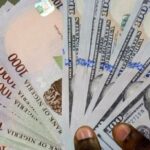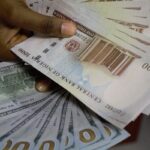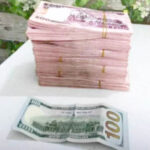Some people and corporate entities are saving their fortunes in dollars as a preferred store of value, Daily Trust investigations revealed.
Some of those who spoke to our correspondents said it was safer, convenient and profitable to hoard dollars because of the dwindling fortunes of the naira, especially in the parallel forex market.
- PODCAST: Nigeria Borrows Again! How Does It Affect You?
- ‘Nigeria imports $20bn machineries, others from Taiwan annually’
Analysts believed that the rush for the dollar and other factors have further exacerbated the pressure on the naira as checks at the bureau de change (BDC) market in Wuse, Abuja and other places showed that the value of the Nigerian currency was fast plummeting.
The United States dollar was yesterday purchased by walk-in customers between N565 to N567 to $1. Similarly, checks in Kano, Kaduna and Lagos showed that the prices fluctuated between N564 and N570/1$.
The BDCs also confirmed huge demand for forex at the moment with some of the operators disclosing that most of the demands were from SMEs that were having difficulty accessing forex from banks.
One BDC operator, Malam Nura, said the demand was high especially from small business owners, saying that the naira might be losing its value partly because of the demand. He, however, could not confirm if individuals were closed betting their naira accounts to dollars to hedge against inflation and devaluation. Nura said that small businesses might have been buying enough to save so that they could continue to import in case the naira value falls further.
“If importers don’t have dollars, and if the naira keeps falling, they may not be able to import and their businesses may be affected. I think this is why they are buying and holding it so that they can have enough for import for a long period,” he said.
According to Ahmed Nasiru, an Abuja-based businessman, “I operate one of these savings accounts that you are not expected to withdraw from after some time. Mine is 5 years 2020-2025.
“But looking at the way things are going in Nigeria, especially how the naira is seriously losing value with nothing concrete being done about it, I am seriously thinking of saving money in a more meaningful foreign currency like the dollar.
“Prices of basic items would keep skyrocketing. There is serious inflation and no meaningful interest paid on our savings; we are also not sure of what will become of this country.
“The fact is that what N1, 000 would buy for you in September 2021, it will not buy the same thing for you in December 2021,” he said.
Govt officials, elites in rush for dollars
A senior management staff of a first-generation bank told Daily Trust that many government officials in ministries and agencies, captains of industry, among others spend dollars in Nigeria unhindered.
“Nigeria as a country has not officially discarded the naira,” he said. Kenneth John, a property developer said some rich people these days go for the dollar instead of investing in property.
“The dollar gives them serious profit without any labour. Some people keep billions of naira in dollars at home and the value keeps appreciating by the day.
“To them, the naira is nothing, it is as good as nothing so they don’t want to be associated with it and this is very dangerous for a sovereign country like Nigeria,” he said.
Schools, hotels, consultants charging in dollars
Hannatu Salihu who works in one of the government agencies said they pay the school fees of their children in dollars.
“Some of the high profile schools don’t want naira. It is worthless to them and therefore, they prefer to be paid in dollars,” she said.
Yusuf Mohammed, a trader at Wuse Market in Abuja, said the demand for foreign goods was aggravating the troubles of the naira.
“We are now a consumption country; Nigerians import almost everything from abroad. They buy lipstick, toothpick, toothpaste, bulbs, soap and utensils from abroad. We import juice, clothes, shoes and any other thing that we can simply produce here. The pressure on the dollar is very high and that is why we are where we are.
“The naira will continue to suffer and Nigerians would continue to pay more money to get basic things unless we have a deliberate policy to reverse the trend. The only way to reverse the trend is to shelve our penchant for foreign goods.
“What is happening now is that people from Niger, Chad and Benin sneak into Nigeria with few dollars and go back with many things,” he said. In Economic parlance, dollarisation of the economy occurs when people in a country use foreign currency in parallel to or instead of the domestic currency as a store of value, unit of account, and/or medium of exchange within the domestic economy.
A financial Analyst, Julius Alagbe, said corporate entities were not exempted from this chase.
He said, “What they are doing is a matching order; fund managers and investment banks are investing in currency of the same denomination to ensure that even if it does not yield a kobo, they will not lose because they know that the investment will return in the dollar.
“It is called forex trading. That is what many banks are using to push up their income statement because they translate their results in naira.
Companies spent $55bn on foreign consultants, workers
A review of Nigeria’s current account data from the Central Bank of Nigeria (CBN) revealed that the country and its corporates spent a sum of $55 billion on foreign expatriates for business, professional and technical services in the last 10 years (2011 and Q1 2021).
With a population of over 206 million people largely dominated by youths with varying academic and professional skillset, Nigeria still suffers from huge capital flight spent on paying foreign expatriates for their professional services.
“While it is a common practice for some Nigerian companies to leverage technology and expertise from foreign-related companies or third parties to drive efficiency in their operations, analysts said blowing $55 billion over 10 years was a massive lift from the economy.
Dollar may hit N1, 000 before January 2022
The Chief Executive Officer, Daniel Young Global Investments Limited, Dr Daniel Young said the development portends danger for the country’s economy.
He predicted that a dollar might be sold at N1, 000 in January 2022 saying the situation calls for introspection on the part of those running the economy.
Young said the only way to stop dollar racketeering was to grow the non-petroleum products and reduce reliance on imported items.
According to Young, “The best time to make money is when there is chaos. Petroleum is no longer an active resource; most countries are growing non-petroleum products. They are growing their economy based on electric cars.
“Everything is going out and we are being left behind. The total annual revenue that the country makes on petroleum is about $18bn and you have borrowed about $84bn from last year; that means in another 10 years, you would still be indebted. What are you selling to cover this cost?” he asked.
An economic analyst, Mr Aderemi Akande, said that the growing trend of individuals converting their naira savings to dollars will further compound the existing problem.
He said the naira will continue to depreciate against the dollar because more people will need it for various purposes.
“The increased demand for dollars that will be orchestrated by the trend will automatically create scarcity as those who genuinely need it for buying and selling of goods may not get it,” he said.
To salvage the situation, Akande, a chartered accountant, advised the Central Bank of Nigeria (CBN) to digitalise the operations of the bureau de change operators to regulate their excesses and monitor what they do.
He also advocated for the issuance of debit cards for dollar accounts as well as criminalising physical holding of foreign currency.
“Every foreign currency should be transferred into domiciliary accounts. CBN should also create a desk at the international airports where foreigners coming into the country can submit their foreign currency in exchange for a naira card equivalent to the currency at hand and follow the same procedure when going to their countries”.
He stressed the need for the National Orientation Agency (NOA) in collaboration with the CBN to sensitise Nigerians on the implications of converting their naira savings to dollars and urged Nigerians to deliberately patronise locally made goods.
A lecturer at the University of Nigeria, Nsukka (UNN), Mr David Akwu, said the free fall of the naira was a dangerous trend on the economy.
According to him, while the CBN decision to stop forex sales to the BDCs was good, the banks should not be trusted to support the apex’s bank policy trust.
He also said that the BDC market was not shallow as being speculated in some quarters.
“A significant number of businesses access forex through the BDCs. So, it is not completely correct to assume that the BDC market is shallow. It is not. Again, a lot of forex from government officials (estacodes) end up at the BDCs and not necessarily the banks. So, the market cannot be said to be shallow,” he said.
He suggested that the CBN should keep a close eye on the banks not to engage in arbitrage to further make a very bad situation of the naira.
He said the banks might be cashing in on the huge dollar value at the street markets as opposed to the official l market.

 Join Daily Trust WhatsApp Community For Quick Access To News and Happenings Around You.
Join Daily Trust WhatsApp Community For Quick Access To News and Happenings Around You.


